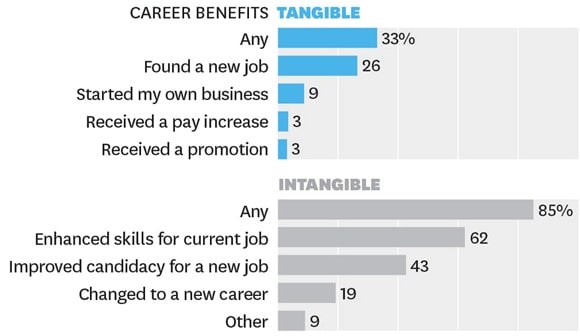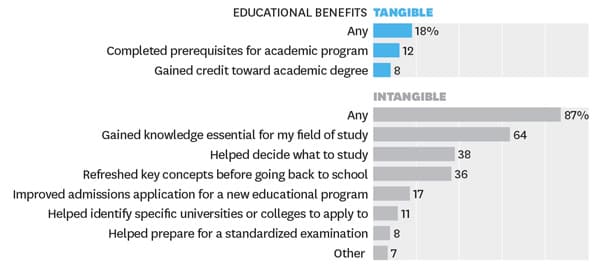How do students benefit from MOOCs?
Most students don’t finish a MOOC, a Massive Open Online Course, and the statistics are consistent on this point across platforms. There are lots of different ideas about what MOOCs are and how they might be used in the future. But the notion that they might further accelerate access to higher education on a truly mass scale has lost some currency since the initial heady days of the first major MOOC rollouts starting around 2012. But what about students who do complete a course? What do they get from their MOOC studies? A new study recently took up the question and its findings were published earlier this week in the Harvard Business Review. In "Who’s Benefiting from MOOCs, and Why," a team of academics – each of which is either employed with the MOOC provider Coursera or with a Coursera-affiliated university – took a closer look at the estimated population of 25 million people who have enrolled in MOOCs to date. In December 2014, the team fielded a survey targeted to 780,000 students in 212 countries who had completed a Coursera course as of September of that year. When you think about it, these are two interesting statistics in themselves. While it’s true that only about 4% of enrolled students go on to complete a course with a provider such as Coursera, the reach of major MOOC platforms is still very impressive.
For example, more than a million students have completed 2.1 million courses from Coursera’s 2012 launch through April 2015.
Getting back to the immediate study at hand, the survey team gathered 51,954 responses from course-competing students. Nearly six in ten (58%) were employed and almost another quarter (22%) were already enrolled (whether full-time or part-time) in “a traditional academic setting.” Just over a third (34%) were from the US, another 39% were from other OECD countries, and 26% were from non-OECD countries.
MOOC your career
The survey explored the ways in which students benefited from completing a MOOC, and it found evidence of real impacts in two key areas:
- More than seven in ten (72%) of respondents reported career benefits – these are characterised as “career builders” in the study;
- Six in ten (61%) reported educational benefits, and are described as “education seekers.”
Indeed, career benefits are the (slightly) more common motivation for taking a MOOC. Just over half (52%) of the survey respondents cited improving their current job or finding a new job as the primary goal of their MOOC studies. In contrast, only 28% note an explicit educational goal – completing perquisite studies, for example – as their reason for completing a MOOC.
When it comes to career benefits, the survey looked at both tangible benefits (e.g., a new job) as well as intangible outcomes, such as “enhanced skills.” Of the 52% of MOOC-completers categorised as “career builders”, 87% reported a career benefit of some kind. 33% reported some type of tangible benefit, such as getting a raise or starting a new business. However, as the following charts reflect, a larger percentage also reported additional, intangible benefits related to career advancement.

"The story is different, however, when you look at tangible career benefits specifically. In developed countries, career builders with low socioeconomic status and lower levels of education report tangible career benefits at about the same rate as those with high status and lots of education. And in developing countries, those with lower levels of socioeconomic status and education are significantly more likely to report tangible career benefits."
MOOC your studies
Of the 28% of course-completers who enrol primarily with an education goal in mind – the “education seekers” – 88% report an education benefit. As with career benefits, the survey sought to measure both tangible and intangible educational outcomes for students, where more concrete results included earning academic credit or completing prerequisite studies.















